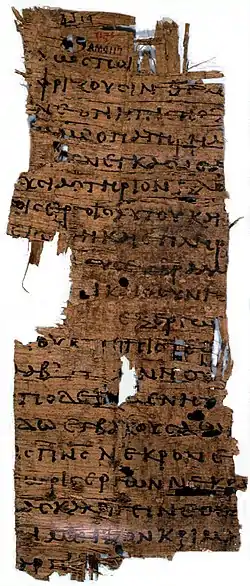James 2
James 2 is the second chapter of the Epistle of James in the New Testament of the Christian Bible. The author identifies himself as "James, a servant of God and of the Lord Jesus Christ" and the epistle is traditionally attributed to James the brother of Jesus, written in Jerusalem between 48–61 CE. Alternatively, some scholars argue that it is a pseudographical work written after 61 CE.[1][2][3] This chapter contains an exposition about the commandment, "You shall love your neighbour as yourself", and about dead faith.[4]
| James 2 | |
|---|---|
 Epistle of James 2:19-3:2 on the recto side of Papyrus 20, from the 3rd century. | |
| Book | Epistle of James |
| Category | General epistles |
| Christian Bible part | New Testament |
| Order in the Christian part | 20 |
Text
The original text was written in Koine Greek.[5] This chapter is divided into 26 verses.
Textual witnesses
Some early manuscripts containing the text of this chapter in Greek are:[6]
- Papyrus 20 (early 3rd century; extant verses 19-26)[7]
- Codex Vaticanus (325-350)[7]
- Codex Sinaiticus (330-360)[7]
- Codex Alexandrinus (400-440)
- Codex Ephraemi Rescriptus (c. 450)
- Papyrus 54 (5th century; extant verses 16-18, 22-26)
An ancient manuscript containing this chapter in the Coptic language is:
No faith with favoritism (2:1–4)
Verse 1
- My brethren, do not hold the faith of our Lord Jesus Christ, the Lord of glory, with partiality.[9]
- "Lord of glory": closely parallels 1 Corinthians 2:8 (kyrios tēs doxes), could be an allusion to the transfiguration of Jesus (Luke 9:32; cf. John 1:14).[10]
Poor and Rich (2:5–7)
The form of address in verse 5a, Listen, my beloved brethren,[11] is found in James' speech at the Council of Jerusalem (Acts 15:13) and nowhere else in the New Testament.[10] Verse 5b recalls Jesus' blessings in the Sermon on the Mount (Matthew 5:3,5; Luke 6:20) about the poor, in contrast to the rich who 'blaspheme the excellent name that was invoked over you' (verse 7).[10]
Love as the Royal Law (2:8–13)
Verse 8
- If you really fulfil the royal law according to the Scripture, "You shall love your neighbor as yourself", you do well;[12]
Contains citation from Leviticus 19:18. Jesus made "Love your neighbor" a 'foremost command' (Matthew 22:39; Mark 12:31).[13] Because of its pre-eminence and because it is sanctioned by Jesus, the king of all that exists, James regards this citation as "the royal law".[13]
Verse 9
- If you show partiality, you commit sin, and are convicted by the law as transgressors.[14]
To act against the poor is like murder, and is judged by the law as such (compare Jeremiah 7:6 and Sirach 34:26).[10]
Verse 11
- For He who said, "Do not commit adultery", also said, "Do not murder". Now if you do not commit adultery, but you do murder, you have become a transgressor of the law.[15]
Contains citation from Exodus 20:13–14; Deuteronomy 5:17–18
Faith alone without works is dead (2:14–17)

Verse 17
- Thus also faith by itself, if it does not have works, is dead.[16]
Faith without the grace of charity is nothing,[17][18] and charity is lost if one does not follow God’s commandments and cooperate with grace by works. Thus, faith without charity and good works is dead. The Church has held since the time of the apostles that dead faith is not life-giving or salvific. However, Protestant teaching holds that dead fiduciary faith is sufficient for salvation.[19]
Even the demons believe (2:18–20)
Verse 19
- You believe that there is one God. You do well. Even the demons believe—and tremble! [20]
Abraham justified by faith and works (2:21–23)
Verses 21–23
- Was not Abraham our father justified by works, offering up Isaac his son upon the altar? Seest thou, that faith did co-operate with his works; and by works faith was made perfect? And the scripture was fulfilled, saying: Abraham believed God, and it was reputed to him to justice, and he was called the friend of God. [21]
Abraham is justified before God by a living faith accompanied by charity and good works, and it is only by this that he is called a friend of God.
Justified by works and not by faith alone (2:24–26)
Verse 24
- You see then that a man is justified by works, and not by faith only. [22]
The consensus of the church fathers is that faith can only give life to, justify and save a soul if it is itself alive with charity (love) and good works. As St Augustine says, “faith itself is only rendered profitable by love, since faith without love can indeed exist, but cannot profit.”[23]
Verse 25
- Likewise, was not Rahab the harlot also justified by works when she received the messengers and sent them out another way?[24]
- "Rahab the harlot": received the Israelite spies by faith (Hebrews 11:31), protected them in her house and let them escape, instead of giving them up to the authority (Joshua 2:1–24).[25] Therefore, she and her family were saved when Jericho was destroyed.[25]
See also
- Abraham
- Battle of Jericho
- Faith
- Jesus Christ
- Ten Commandments
- Related Bible parts: Genesis 15, Exodus 20, Leviticus 19, Deuteronomy 5, Joshua 2, 1 Samuel 16, Galatians 5, Hebrews 11
References
- Riesner 2007, p. 1256.
- Davids, Peter H (1982). I Howard Marshall and W Ward Gasque (ed.). New International Greek Testament Commentary: The Epistle of James (Repr. ed.). Grand Rapids, Mich.: Eerdmans. ISBN 0802823882.
- Evans, Craig A (2005). Craig A Evans (ed.). Bible Knowledge Background Commentary: John, Hebrews-Revelation. Colorado Springs, Colo.: Victor. ISBN 0781442281.
- Riesner 2007, p. 1257.
- 20. James: Introduction, Outline, and Argument. Bible.org
- "The New Testament Virtual Manuscript Room, Institute for New Testament Textual Research (INTF), Münster". Archived from the original on 2015-06-13. Retrieved 2015-06-15.
- Riesner 2007, p. 1255.
- Aland, Kurt; Aland, Barbara (1995). The Text of the New Testament: An Introduction to the Critical Editions and to the Theory and Practice of Modern Textual Criticism. Erroll F. Rhodes (trans.). Grand Rapids: William B. Eerdmans Publishing Company. p. 96. ISBN 978-0-8028-4098-1.
- James 2:1 NKJV
- Riesner 2007, p. 1259.
- James 5:2
- James 2:8 NKJV
- Hart 2014, p. 1951.
- James 2:9 NKJV
- James 2:11 NKJV
- James 2:17 NKJV
- "1 Corinthians 13 DRA - If I speak with the tongues of men, and - Bible Gateway". www.biblegateway.com. Retrieved 2021-01-20.
- "Galatians 5:6 DRA - For in Christ Jesus neither - Bible Gateway". www.biblegateway.com. Retrieved 2021-01-20.
- "Justification". www.newadvent.org. Retrieved 2021-01-20.
- "Bible Gateway passage: James 2:19 - New King James Version". Bible Gateway. Retrieved 2021-01-20.
- James 2:21-23 DRA
- James 2:24 NKJV
- "CHURCH FATHERS: On the Trinity, Book XV (St. Augustine)". www.newadvent.org. Retrieved 2021-01-20.
- James 2:25 NKJV
- Hart 2014, p. 1952.
Sources
- Davids, Peter H. (1994). "James". In Carson, D. A.; France, R. T.; Motyer, J. A.; Wenham, G. J. (eds.). New Bible Commentary: 21st Century Edition (4, illustrated, reprint, revised ed.). Inter-Varsity Press. pp. 1354–1368. ISBN 9780851106489.CS1 maint: ref=harv (link)
- Hart, John F. (2014). Rydelnik, Michael; Vanlaningham, Michael (eds.). The Moody Bible Commentary. Moody Publishers. ISBN 9780802490186.CS1 maint: ref=harv (link)
- Riesner, Rainer (2007). "76. James". In Barton, John; Muddiman, John (eds.). The Oxford Bible Commentary (first (paperback) ed.). Oxford University Press. pp. 1255–1263. ISBN 978-0199277186. Retrieved February 6, 2019.CS1 maint: ref=harv (link)
External links
- James 2 King James Bible - Wikisource
- English Translation with Parallel Latin Vulgate
- Online Bible at GospelHall.org (ESV, KJV, Darby, American Standard Version, Bible in Basic English)
- Multiple bible versions at Bible Gateway (NKJV, NIV, NRSV etc.)